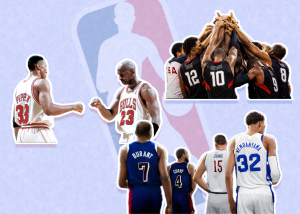Why All Seniors Should Take Deconstructing Race
February 17, 2021
In an era where racial tension is in the public eye more than ever, an English class centered on race and racism is exactly what students need in their high school curriculum. English 4: Deconstructing Race provides just that to the senior class, combining the requisite literary analysis and writing skills of a regular English class with the subjects of race, racism, and anti-racism. Incoming seniors should strongly consider taking Deconstructing Race before graduation because of its timely subject matter, engaging curriculum, and the skills it teaches for living in a global community.
Seniors will have multiple options for English 4 next year, including AP English Literature and Composition; Literature, Film and Media; Women’s Literature; and English 4/WISE. Deconstructing Race differs from all of these because it covers far more than just English. “I’m hoping seniors will learn about how race and racism impact all of us psychologically, sociologically, and politically. Students will learn some history they may not have learned before. They will also strengthen their ability to communicate by engaging in challenging and personal conversations,” Steve Poling, who teaches Deconstructing Race, said.
The readings for the class focus on contemporary literature. The book list includes Beverely Tatum’s “Why Are All the Black Kids Sitting Together in the Cafeteria?”, Ibram X. Kendi’s “How to be an Antiracist,” Jean Stefancic and Richard Delgado’s “Critical Race Theory: An Introduction,” and Robin DiAngelo’s “White Fragility.” Most of these were published within the past decade and have had a resurgence in popularity in light of the Black Lives Matter protests. Another difference, Poling points out, is that the reading “will include a lot more nonfiction than you may be used to in English… We will definitely use poetry and storytelling and tap into that, but a lot of reading falls into the category of nonfiction, a lot of reading about psychology, sociology, culture, history, and areas like that.” Deconstructing Race provides the perfect deep dive into literary nonfiction with a mix of psychology and sociology that most English classes don’t address.
The textual analysis students are asked to engage in extends off the page. Students have the opportunity to analyze podcasts, journalism, videos, and film clips to gain a greater understanding of race and racism in our media and culture. “My favorite video that we have analyzed is the Whiteness Project Videos because this was my first time hearing someone white be able to talk freely about race. When a conversation is started about race, most people don’t like to talk because they don’t want to offend anyone,” senior Jalen Miller said. Deconstructing Race draws in multiple perspectives and allows students to interact with the material in a variety of ways, making each class an exciting encounter with a blend of visual and auditory information.
The description of the class in Miramonte’s course catalog states, “students will discuss, write, and engage in research about their origins, their identities, and the awareness of how race, racism, and anti‐racism impact their lives.” In the classroom, this translates into unique opportunities and projects for students to discuss difficult topics. One highlight of the year is a project in which students create a podcast with their classmates. Each student selects a book centered on racial issues from a list of new material from the Miramonte library. Groups then record podcasts discussing the books and the students’ reactions to them.
The 2020-2021 school year is the first year Deconstructing Race has been offered and many seniors report positive experiences. “I signed up for Deconstructing Race because I’m really passionate about social justice and I wanted to improve my understanding of race and racism,” senior Jenna Foster said. “This class creates a space to further that education while also continuing to improve reading and writing skills like I would in any English class.” But you don’t need a special interest in social justice to enjoy Deconstructing Race. “I didn’t really think much about signing up for the class; I just did it on a whim. I am so glad I ended up taking this class. I would recommend it because it is a safe place to get comfortable discussing the topic of race and an amazing way to step outside your own perspective,” senior Fiona Young said.
Deconstructing Race teaches valuable life lessons on communication, teachings that seniors can take with them after leaving high school. “You’ll be able to draw from a thorough understanding of concepts, tools, and historical knowledge and make conversations as impactful as possible,” Foster said. “I’ve already used the information I’ve learned in Deconstructing Race in multiple conversations with friends and family, and even in other classes and academic work regarding race.” Moreover, the class opens students up to new perspectives. “It’s a way to show those who have spent their whole lives in an all-white environment how life is for others that don’t look like them, for those who don’t have the same privileges as them,” Miller said.
Current juniors surveying the course catalog to build their schedules for next year should take a close look at Deconstructing Race. It is one of the best English classes Miramonte offers. “More than ever right now there is a global conversation going on about race, and everyone needs to be a part of it,” Young said. “This class is for everyone who wants to engage in those conversations feeling prepared, supported, and knowledgeable.” Deconstructing Race empowers students to learn about race and racism in a world where racial inequity is at the forefront of mainstream media and current events. But more than just another English class, “Decon” builds students’ character. “In five powerful words: equity, inclusion, unity, love, and dignity,” Poling said, describing the class. “So if you are a believer in those values and want to do this work and challenge yourself, then I think this is definitely a course for you.”







